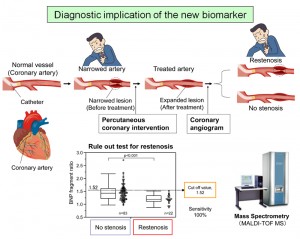Development of a new blood test to detect ischemic heart disease Biomarker development using mass spectrometry techniques


© The University of Tokyo Hospital. All Rights Rserved.
Figure: Diagnostic implications of the new biomarker
Percutaneous coronary intervention procedure on coronary artery disease. A coronary angiogram is routinely performed at six months after treatment to assess development of renarrowing of the lesion (restenosis). BNP fragments (as defined by the described index) were significantly lower in patients with restenosis at time of the follow-up coronary angiogram. Restenosis was not found when the index ratio exceeded 1.52, indicating that this index may be used as a diagnostic tool to assess the development of restenosis.
Ischemic heart disease is characterized by a reduced flow of blood to the heart, and is commonly treated by a catheter-based intervention such as balloon angioplasty or stent implantation to widen the artery and restore blood flow. However, patients undergoing such procedures are at risk for restenosis, or renarrowing of the lesion, as seen in 10%-30% of patients. Because of this, a coronary angiogram is routinely performed in Japan at six months after treatment to assess development of restenosis, but the procedure is costly and carries burden of irradiation and risk of adverse side effects associated with the invasive procedure. A non-invasive method to detect restenosis is therefore needed.
Toru Suzuki (Associate Professor, Departments of Cardiovascular Medicine and Ubiquitous Preventive Medicine, The University of Tokyo Hospital) with former department chair, Ryozo Nagai, and current chair, Issei Komuro, in collaboration with Hirotaka Fujimoto (Chief Researcher, Technology Research Laboratory, Shimadzu Corporation) developed a blood test using mass spectrometry methods to detect the presence or absence of restenosis. This method is expected to assist in the decision making as to whether a coronary angiogram is needed in patients to assess restenosis. This study has been published in Chemical Chemistry (online on May 13 EST). Clinical application of the method will be pursued at the University of Tokyo.
Press release (Japanese)
Paper
Hirotaka Fujimoto, Toru Suzuki, Kenichi Aizawa, Daigo Sawaki, Junichi Ishida, Jiro Ando, Hideo Fujita, Issei Komuro, Ryozo Nagai,
“Processed B-Type Natriuretic Peptide Is a Biomarker of Postinterventional Restenosis in Ischemic Heart Disease”,
Clinical Chemistry 2013/05/13, doi: 10.1373/clinchem.2013.203406.
Article link
Links
Department of Ubiquitous Preventive Medicine, Graduate School of Medicine







